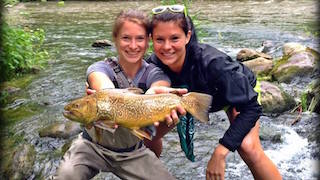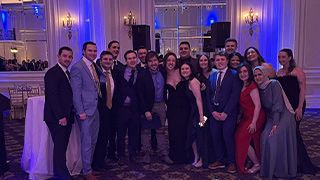The Art and Science of Fly Fishing
Wednesday, March 23, 2016

Photo courtesy of Kate Kelly
What better way to experience summer than to surround yourself with the beauty of nature? This summer, Seton Hall offers you a way to do just that – and earn three undergraduate credits in the process.
From May 17 through June 6, the Environmental Studies Program will be running “The Art and Science of Fly Fishing” (ENVL 3053) as part of Summer at Seton Hall. Taught by associate professors Michael Taylor and Robert Pallitto, the course is designed for a wide audience and doesn’t require any prior experience with fishing. “Dr. Pallitto and I both enjoy fly fishing. He’s written about the topic for a number of publications,” says Dr. Taylor. “As director of the Environmental Studies Program, I’m excited to be teaching this course with him.”
To gain a true appreciation for the art of fly fishing, students will begin the course in the classroom. Fly fishing has inspired countless works of art and literature since the 15th century. Through a combination of lectures and in-class exercises, Dr. Taylor and Dr. Pallitto will spend the first third of the course introducing students to many of these classics and examining common themes of spirituality, purpose and the connection that humans share with nature.
The remaining two thirds of the course will consist of field trips and stream fishing in some of the most beautiful and scenic spots in New Jersey, including Califon, Long Valley and Oxford. There, students will learn the basics of fly fishing – and in doing so, they will develop a practical understanding of the natural sciences, including the dynamics of stream health and water quality, basic entomology and the life cycle of trout. Students will also learn the life cycle of the mayfly, a common food source for trout, by tying flies that imitate the various life stages. “Fly fishing provides an exceptional platform for exploring the multi-disciplinary aspects of environmental studies through active learning,” says Dr. Taylor. “It’s also a craft that requires practice and concentration, lending itself to the exploration of mindfulness. It’s literally an immersive experience of connecting with nature by physically wading into the rivers that run through it.”
Interested students should contact either Dr. Taylor or Dr. Pallitto for more details and to enroll in the course.





